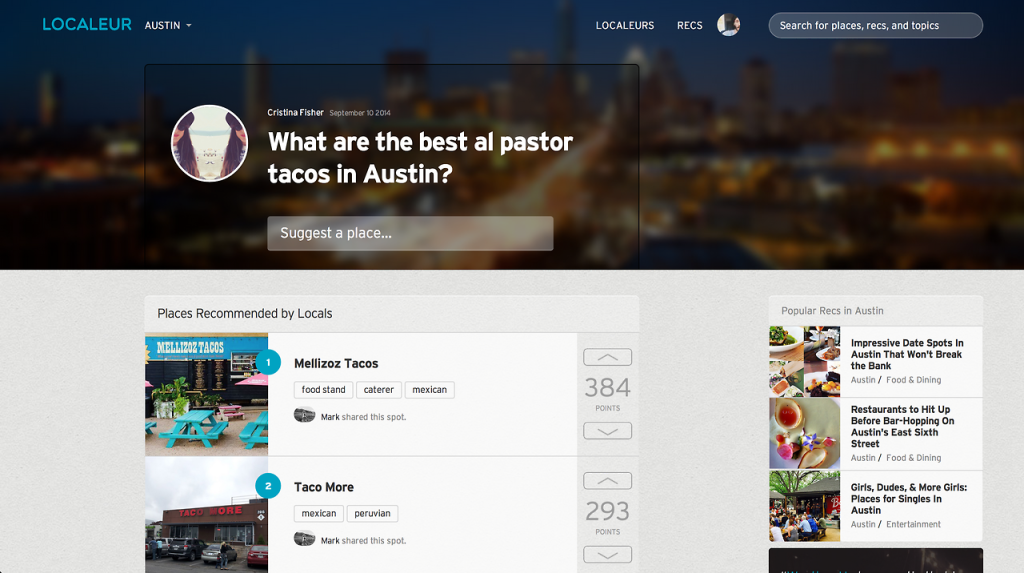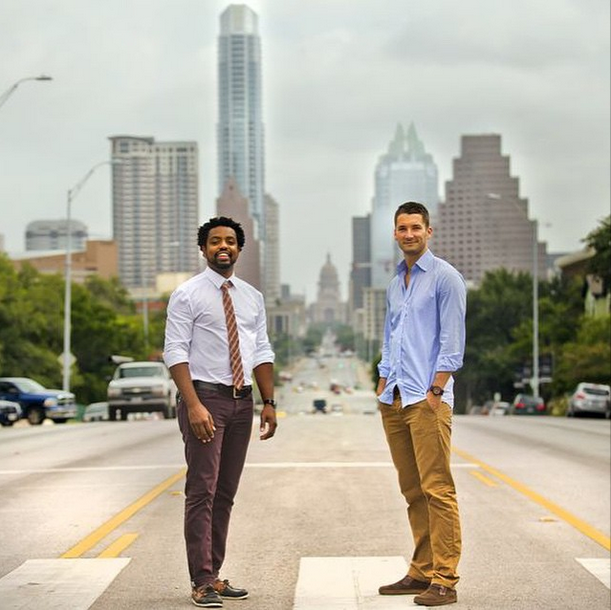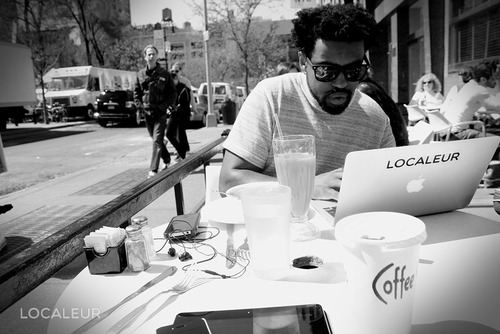A local business without online recommendations is at a major disadvantage. But getting the right reviewers is just as important as getting the right reviews.
One of the tenants of Millennial spending is that we do the research. Whether it’s an in-the-moment Yelp search of a new coffee shop or a more in-depth search for feedback on a TV we’re wanting to buy, we want to know what’s good before we invest the time and money.
Localeur cofounders Joah Spearman and Chase White not only identified with this idea, but more specifically, they wanted more quality recommendations when they were away from home.
In 2012, Spearman and White were working together at Bazaarvoice — a hot Austin software startup that rates good reviews for enterprise — when White went on a trip that ultimately inspired Localeur.
He was visiting Park City, Utah and wanted some suggestions of places to go on his trip. But not just top-rated Yelp suggestions. He and Spearman realized that what they were really wanting were honest, quality recommendations from people who actually live in these cities.
In a nutshell, Spearman told me that their mission with Localeur is to make travel local.
(For more startup insight, check out the full Startup Stories series.)
The Idea
Localeur is a website and app where you can go to read the recommendation roundups of hand-picked Localeurs in 12 cities. These people are not only locals but have actually visited the places that they’re talking about, from the best bars for happy hour to the best places to get guacamole.
If you live in a tourist-heavy city, you know that there’s a big difference between where the tourists go to hang out and where the locals go. While he was in Park City, White wanted to go where the locals go. He and Spearman talked about this idea for months, sharing their travel experiences and discovering what review sites were missing.
Spearman said, “I remember [White] saying the words ‘experience local,’ and we realized that that was really the crux of what this business could be.”
They launched Localeur as a web platform in March 2013 at South by Southwest (SXSW) — in fact they had their third annual SXSW party just yesterday.
It was an ideal time/place not only because of all of the innovation being shown throughout the music/film/tech conference, but also because Austin is their city and they were able to show the thousands of visitors how to experience their Texas town beyond what you’ll find on 6th Street. People loved it.

A Minimal Launch
Once Spearman and White solidified their plans for Localeur in early 2013, Spearman started calling his friends around the country to see if he could gain some financial interest. Six out of the first dozen people he called invested and that was the money that they needed to launch.
For the past couple years, they’ve run Localeur as lean as possible. Spearman said,
“We’re not like a lot of NY or SF startups where you go out [and] raise … $2 million and you can start something. We, at no point, had more than two or three months of runway.”
With this model, Spearman said they were constantly having to prove that they could make their business work to be able to raise more funds. Of course, timing was key too.
They launched small with Austin as their flagship city and 15-20 Localeurs racking in recommendations of must-see, must-eat, must-visit places. They used the momentum of SXSW to raise more money and expand to more cities one-by-one.
Spearman said they expanded in phases. After they proved that the site worked in Austin, they went to Houston. Atfer they proved it could work in two cities, they moved it outside of Texas to San Francisco, New York and LA. Now they’re in 12 cities including Atlanta, Chicago, Seattle, D.C., Miami, Denver, and Dallas.
Web vs. Mobile
Any must-have tech resource pretty much has to be an app these days or at least a very mobile-friendly site. But when Localeur launched in 2013, they were web only with an iOS app release a full year later.
Why? “We launched as web first just because that was the easiest way for us to get to market,” Spearman explained.
After they had significant proof that this was a resource people were willing to use regularly, then building the app became a priority. He said, “We know that [the app] is not where we want it to be ultimately as a product, but it’s been good enough at this stage to get us quite a bit of favorable press from the Today Show … and all these other publications.”
He said that, even though they still want to make a lot of progress with the app, it’s really popular in the App Store (Android coming soon), and it’s a real testament to how powerful their content is. Last year, 40% of their users were mobile, whereas this year it’s 70%. But launching web first actually taught them some lessons they wouldn’t have learned if they had started on mobile.
Travelers do different things on web and mobile.
Spearman said they realized that travelers on mobile are often looking for an in-the-moment recommendation, while travelers on the web are more often in the inspiration stage of their travel plans.
People share more on the web.
They observed that, on the web, locals are more open to the idea of telling people about their favorite spots; there’s less of a fear about losing their hangout spot to other locals.
Spearman said that Millennials especially have that initial hang up about divulging their favorite place to the masses. But on the web, he said, “There was distance between informing people about places and actually going [to them].”
Keeping It Local
While Localeur was initially built for the travel use case, the founders are finding more and more that it’s not only a resource that’s fueled by locals, but an ideal resource for locals to use as well. In fact, Spearman said,
“We’re actually growing much more quickly by targeting locals than we are by targeting travelers.”
Whether the user is a traveler or a local, Localeur’s mission and success is built on an expectation of reliability and credibility.
By not only picking a select group of Localeurs per city, but also putting a face and byline to their recommendations, the anonymity seen on other review services is gone. Not to mention, Localeur ensures that these people are in fact locals.
Spearman said, “There’s a sense of immediacy and credibility that comes with the people who get to walk those streets and see those businesses everyday.” Localeur is just like asking a friend who lives in a city what you should do while you’re visiting.
In fact, he had a friend who messaged him about the best venues for SXSW, and Spearman sent him a link to a list he’d compiled for Localeur. It’s taking away that extra step and eliminating any skepticism you might have about untrusted online reviews.
He said that people are getting comfortable with the idea that Localeur can even replace services like Yelp and Foursquare.
Perfecting an Evolving Model
“A lot of people have gotten this business model wrong,” Spearman said.
While a lot of people still use Yelp, we’ve all heard horror stories about businesses hitting some major pitfalls on account of paid or just false reviews. He added,
“Yelp is a big, successful company, but I think fundamentally one of the things that they’ve done wrong is they really inherently haven’t brought the value to the local businesses in the way that they can prove their value constantly. I think there’s a huge kind of anti-Yelp movement as a result of that.”
A lot of what’s making business models like Foursquare and Yelp become stale is that they’re not tapping into the needs of modern travelers and locals.
One part of it, Spearman said, is “… with business models like Uber’s and Airbnb’s … people are really, really focused on trying to have access to the best information as quickly as possible. And what that does is give you an additional comfort level when you’re traveling.”
In addition to immediacy, comfort is the second need of the modern traveler. Spearman said that in the ‘80s and ‘90s, “[Travelers] were okay with feeling like tourists because it was a way for them to take a break from their daily lives.” But now, you’re seeing less people exclusively hitting up tourist attractions and instead getting a real feel of what it’s like to live in a place.
Spearman added, “I think now … our generation kind of likes the lifestyle that we have, so when we got to New York or Portland or London or some other city, we’re not trying to just take a break from life necessarily, we’re just tying to maybe take a break from work and then go and experience a new city. So we still want to have that comfort of feeling like [we’re at home].”
The real value in getting advice from locals is that you can choose the kind of place you want to grab coffee in the morning and to go to happy hour at night, and you’re not just searching the best places for tourists.
For Localeur, it’s about making sure that you really feel comfortable and familiar wherever you go.
What Makes a Localeur?
After hand-picking the Localeurs in Austin, Spearman said that now their existing Localeurs invite new people to the community as they launch in new cities. They currently have about 250 contributors across their 12 cities making recommendations for over 300,000 users.
As the site has gained credibility, Spearman said, “Now there’s a lot more value in what it means to contribute to Localeur.” But certain Localeurs get compensated in more than authority.
To support their select Localeurs as well as continuing to support local businesses, Spearman said they pay contributors under $100 for a recommendation.
“The idea is that we’ve been giving them just enough compensation to justify returning to these businesses even more frequently than they already do,” he explained. Basically, it’s enough to sustain your brunch habit while keeping people informed about the places where you’re eating or the things you’re doing.
Keeping Localeurs out and about in the community is pivotal, especially when creating something as substantial as their SXSW guide. Spearman said that, unlike a writer who flies down from New York to write an article about the best BBQ in Austin for SXSW, the Austin Localeurs have been there all year trying new places and keeping tabs on the old to ensure that users are getting the full dish on what’s good.

A Wider Net for Locals
Other than the fact that you have to be a local to recommend a place on Localeur, a big factor that set them apart is that you had to be selected. This exclusivity gave them a specific edge and kept the quality top notch while they were setting the tone for their initial launch cities.
But as they continue to grow, they’re expanding the platform to be more open to more locals.
They had an idea for CrowdRecs in which locals can go in and add a place or vote a place up or down. They can’t create entire posts like Localeurs, but it’s getting more locals involved in a crowdsourced way and people have really liked it so far.
In fact, Localeur has seen a 4,000% increase in social sharing since they started CrowdRecs. It’s more than just the self-centered need to put in your own two cents; Spearman said that it gives you a sense of altruism by helping the community.
He added, “Our idea about curation has opened up a little bit.” People already have high expectations for the platform and now they can contribute to it, but you still have to be a local.
They regulate this with a Facebook login so they can verify your city. And to make sure people don’t get upvote happy on their favorite haunt, you can only vote on a place once.
Right now, Localeurs leave recommendations through a CMS that gets edited by the Localeur team and then published. In the future, Spearman said they’ll be rolling out a system specifically for CrowdRecs across web and mobile.
Growing from this new feature, Spearman said he sees potential for a more hybrid model in which they’ll be looking for influencers and figuring out unique ways to engage and reward them through partnerships with airlines, hotels, restaurants, etc.
A Fleeting Partnership
Six weeks after they launched, Localeur was contacted by Google to work in some capacity with their Field Trip app. Spearman said they ignored the request for a while because they were unsure about Google’s intentions.
Eventually Spearman said they agreed to a short-term partnership to feature some of their Localeur recommendations on the Field Trip app. But at the earliest point possible, they ended it.
He said that after acquiring Zagat and Frommer’s with little success, it’s clear that Google doesn’t know yet what their travel strategy is going to be. He added,
“It was a smattering of a lot of content, but not a lot of the focus and utility, so it ended up not being a good entry point for someone to find out about Localeur. We’d rather them find out directly from us.”
Still, Spearman said it was a great short-term partnership for them, and if imitation is indeed the sincerest form of flattery, then Localeur should be tickled pink.
“Google is copying us,” he said. And with a quick scroll through Google’s Local Guides program, it seems that he’s probably not too far off. He’s seen other updated features and designs across travel brands that seem to take inspiration from Localeur. “[It’s] evidence that the market is catching up to us.”

What’s Next
For the last two years, the entire Localeur team has been just Spearman, White and a team of freelancers. But as the market is catching up to them and they continue to roll out new cities and features like CrowdRecs, they found that it was about time to hire their own team.
As of this month, they now have four employees and they’re on their way to building all of the product and content that they’ve planned for. They’re going to launch New Orleans and Portland this year and will start to think international starting in 2016.
They’ve also raised investments from Facebook executives who Spearman said are really confident and passionate about the mission of Localeur. Spearman is convinced that “authenticity and credibility” will continue to set them above their competition.
If you’re at South by Southwest, look out for Localeur and definitely be sure to reference their exclusive SXSW guide for all of the best eats, drinks and venues in Austin, as told by locals.
Stay tuned with Localeur via Twitter and download the app for free on iOS. If you’re on Android, you can expect to see an app for your device coming this year.
Images provided by Localeur




